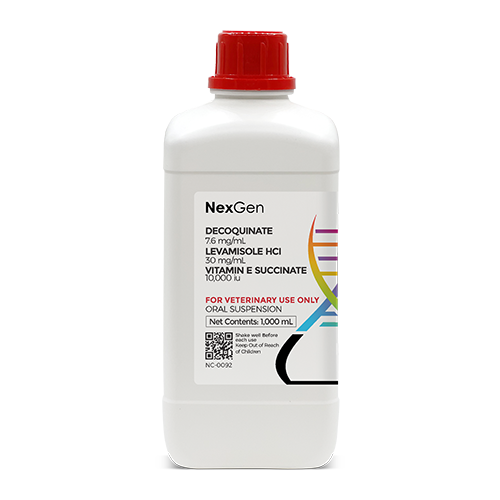
Decoquinate 7.6 mg/mL + Levamisole HCl 30 mg/mL + Vitamin E Succinate 10,000 iu, Oral Suspension, 1000mL
Login for pricing
- Brand
- Mixlab
- SKU:
- NC-0092
- Product Type:
- Suspension
- Size:
- 1000ml
- Administration:
- Oral
One of the most serious diseases of horses in the Americas is equine protozoal myeloencephalitis (EPM), a condition that affects the central nervous system. EPM is a disease of the brain and/or spinal cord of the horse, which is caused by the protozoan organism Sarcocystis neurona.
This disease was first described in the 1960s; at the time it was designated as “segmental myelitis.”1 By the mid-1970s, it was determined that it was caused by a protozoan organism, and a few years later, researchers drilled down to S. neurona. In the late 1990s, another organism called Neospora hughesi was shown to also cause EPM in horses, although it is much more rarely the causative agent than S. neurona. EPM is a disease that is typically found in the Western Hemisphere and is not commonly seen in other parts of the world.
Origins, Occurrence and Symptoms of EPM
Many horses in the Western Hemisphere have been exposed to the S. neurona parasite, as most horses in the United States will evidence the antibody to S. neurona in their blood. In some areas of the country over 90 percent of horses will be seropositive to S. neurona. Fortunately, only a very small percentage of horses that are seropositive to either the S. neurona or N. hughesi parasites will ultimately develop EPM.1
Sarcocystis neurona has a two-host life cycle which includes both a definitive host and several likely intermediate hosts. In 1995, the opossum was determined to be the definitive host of this parasite. The opossum sheds the infective form of the parasite (sporocysts) in its feces. These are then ingested by the horse, usually through grazing or drinking contaminated water or feed. The parasite does go through a maturation or reproductive phase and eventually produces a form of the parasite which then migrates to the central nervous system giving rise to the clinical disease referenced as EPM.2
The clinical signs of EPM can be varied, and are often asymmetrical (presenting differently on either side of the horse). These can include:
-
Ataxia (incoordination), spasticity (stiff, stilted movements), abnormal gait or lameness
-
Incoordination and weakness, which worsens when going up or down slopes or when head is elevated
-
Muscle atrophy, most noticeable along the topline or in the large muscles of the hindquarters, but can sometimes involve the muscles of the face or front limbs
-
Paralysis of muscles of the eyes, face or mouth, evident by drooping eyes, ears or lips;
-
Difficulty swallowing
-
Seizures or collapse
-
Abnormal sweating
-
Loss of sensation along the face, neck or body
-
Head tilt with poor balance; horse may assume a splay-footed stance or lean against stall walls for support2
Levamisole is classified by the Association of Racing Commissioners (ARC) International’s Uniform Classification Guidelines as a Class 2, Penalty Class B substance.
Vitamin E is a powerful antioxidant that helps neutralize free radicals, the damaging by-products of normal cellular activity and environmental contaminants. For quite a few years, veterinarians have recommended that horses undergoing treatment for EPM and other neurologic issues be supplemented with Vitamin E to support muscle and nervous tissue.
Vitamin E is a collective term for a family of eight stereoisomers found in plants. Each of the eight forms has a different methylation group that affects its bioavailability. The stereoisomers contain two tocopherols and tocotrienols, each of which consist of four similar compounds distinguished as alpha, beta, gamma, and delta. The most bioavailable source of Vitamin E is natural d-alpha-tocophorol.4
Where to buy Decoquinate + Levamisole + Vitamin E
Decoquinate + Levamisole + Vitamin E is available in the U.S. as a compounded veterinary preparation. Studies have shown that Decoquinate combined with Levamisole reduce the clinical signs and serum SAG 1, 5, 6 antibodies in horses with Equine Protozoa Myeloencephalitis (EPM).5
FOR RX ONLY: A valid prescription from a licensed veterinarian is required for dispensing this medication.
1MacKay, R., Morgan, K. Equine Protozoal Myeloencephalitis. In: J. American Association of Equine Practitioners, Jan. 2020.
2aaep.org.
4ker.com.
5Ellison, Lindsay. Intern J Appl Res Vet Med. Vol. 10, No. 1, 2012.


















